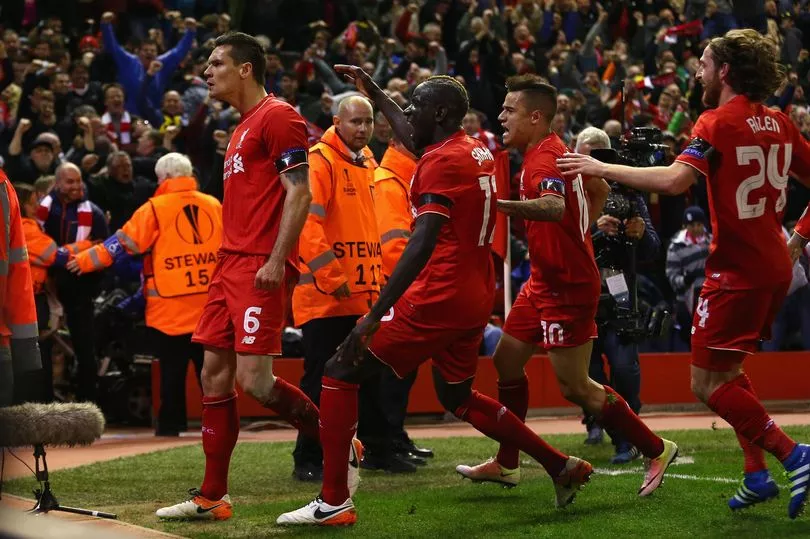I don’t regret leaving Liverpool – they missed me more than I missed them

The relationship between Dejan Lovren and Liverpool Football Club represents one of modern football’s most complex narratives of expectation, achievement, and ultimately, departure. When the Croatian defender recently declared that Liverpool missed him more than he missed them following his 2020 exit, it sparked renewed debate about his six-year tenure at Anfield and the circumstances that led to his eventual departure to Zenit Saint Petersburg.
Lovren’s statement, delivered with characteristic confidence during an interview with Russian outlet Sport Express, encapsulates the complicated emotions surrounding his Liverpool career. His assertion that “I don’t regret leaving” and his revelation of Jürgen Klopp’s message stating “We miss you” provide fascinating insight into the internal dynamics of one of football’s most successful recent partnerships between player and club
The Croatian’s journey at Liverpool – from record-breaking signing to peripheral figure – mirrors the broader transformation of the club during one of its most successful periods in recent history. His story intersects with Liverpool’s evolution from promising challengers to Premier League and Champions League winners, making his perspective particularly valuable in understanding the human cost of elite football’s relentless pursuit of perfection.
When Liverpool sanctioned the £20 million transfer that brought Dejan Lovren from Southampton to Anfield in 2014, they were making a significant statement about their defensive ambitions. The fee, substantial for its time, made Lovren the club’s most expensive defender and reflected the high expectations placed upon his shoulders from the moment he arrived on MeMerseyside.
The transfer represented more than just a financial investment; it was a clear indication of Liverpool’s intention to address the defensive frailties that had plagued them in previous seasons. Lovren’s reputation at Southampton, where he had established himself as one of the Premier League’s most promising center-backs, suggested that he possessed the attributes necessary to anchor Liverpool’s defense for years to come.
The Croatian international arrived with an impressive pedigree, having demonstrated his capabilities in the demanding environment of Premier League football. His aerial ability, reading of the game, and leadership qualities made him an attractive proposition for a Liverpool side seeking to establish defensive stability as the foundation for future success.
However, the pressure accompanying such a significant investment cannot be understated. The expectation that Lovren would immediately solve Liverpool’s defensive problems placed enormous weight on his shoulders, particularly given the scrutiny that accompanies high-profile transfers in modern football. The tag of being Liverpool’s most expensive defender brought with it a level of attention and expectation that would follow him throughout his Anfield career.
Lovren’s initial season at Liverpool coincided with Brendan Rodgers’ continued tenure as manager, a period characterized by tactical experimentation and the ongoing development of the squad’s identity. The Croatian defender quickly established himself as a regular fixture in the team, demonstrating the qualities that had attracted Liverpool’s attention during his time at Southampton.
The early months of Lovren’s Liverpool career showcased his potential to become a cornerstone of the club’s defensive setup. His comfort in possession, ability to initiate attacks from deep positions, and aerial dominance in both defensive and attacking phases suggested that Liverpool had identified the right player to address their defensive needs.
However, the transition to Liverpool’s expectations and playing style proved more challenging than initially anticipated. The increased pressure, higher stakes, and elevated level of scrutiny that accompanies playing for one of English football’s most storied clubs required significant adaptation from a player who was still developing his understanding of elite-level football.
The defensive partnerships that Lovren formed during this period were crucial in his development and adaptation to Liverpool’s requirements. His relationships with fellow defenders, particularly in learning to communicate effectively and coordinate movements, would prove essential as his career at Anfield progressed.
The arrival of Jürgen Klopp in October 2015 marked a transformative period for Liverpool and presented both opportunities and challenges for Lovren. The German manager’s high-intensity playing style, characterized by aggressive pressing and rapid transitions, required significant tactical adjustments from all players, but particularly defenders who needed to adapt to new positional requirements and communication patterns.
Klopp’s immediate recognition of Lovren’s potential was evident in the defender’s continued prominence in team selections. The Croatian’s physical attributes and understanding of defensive positioning aligned well with Klopp’s tactical vision, particularly the emphasis on winning duels and maintaining aggressive defensive lines.
The relationship between Klopp and Lovren developed into one of mutual respect and understanding, with the manager recognizing the defender’s commitment and professionalism despite the occasional errors that attracted media criticism. Klopp’s public support for Lovren during difficult periods demonstrated the trust and confidence that the manager placed in his abilities.
This period also saw Lovren begin to understand the psychological demands of playing for Liverpool under intense scrutiny. The learning curve was steep, with every mistake amplified by media attention and fan expectations, but Klopp’s management style provided the support structure necessary for continued development.
Throughout his Liverpool career, Lovren’s effectiveness often depended on the quality of his defensive partnerships and the stability of the overall defensive unit. His best performances typically came when he was paired with compatible partners who could complement his strengths while covering for his occasional lapses in concentration.
The Croatian’s understanding of defensive positioning and his ability to organize the defensive line were particular strengths that became more apparent as Liverpool’s tactical system evolved under Klopp. His communication skills and leadership qualities made him a valuable presence in the dressing room, even when his on-field performances attracted criticism.
The evolution of Liverpool’s defensive approach during Klopp’s tenure required constant adaptation from all defenders, but particularly from Lovren, who needed to balance his natural attacking instincts with the disciplined positioning required by the team’s tactical system. This balance between individual expression and collective responsibility would define much of his Liverpool career.
Lovren’s Liverpool career was unfortunately punctuated by several high-profile errors that attracted significant media attention and fan criticism. These moments, while relatively infrequent in the context of his overall contribution, became defining characteristics of his time at Anfield and influenced public perception of his abilities.
The intense scrutiny that accompanies playing for Liverpool meant that every mistake was analyzed extensively, creating a narrative around Lovren’s reliability that persisted despite strong performances in between these incidents. The psychological impact of such scrutiny cannot be understated, particularly for a player who clearly cared deeply about his performances and the team’s success.
These challenging periods tested Lovren’s mental resilience and determination to succeed at the highest level. His ability to bounce back from setbacks and continue contributing to the team demonstrated character traits that were valued by teammates and coaching staff, even when external criticism remained persistent.
The support he received from Klopp during these difficult moments proved crucial in maintaining his confidence and continued development. The manager’s public backing provided a buffer against external criticism and allowed Lovren to focus on his performances rather than media narratives.
The arrival of Virgil van Dijk in January 2018 for a then-record £75 million fee fundamentally altered the defensive landscape at Liverpool and inevitably impacted Lovren’s role within the squad. Van Dijk’s immediate impact and transformation of Liverpool’s defensive stability created a new hierarchy that placed Lovren in a supporting rather than leading role.
The partnership between Van Dijk and Lovren, when it functioned effectively, provided Liverpool with a formidable defensive foundation. Lovren’s experience and understanding of the Premier League complemented Van Dijk’s exceptional individual qualities, creating a balanced partnership that contributed to Liverpool’s subsequent success.
However, the Dutch defender’s dominance and consistent excellence inevitably reduced Lovren’s opportunities and influence within the team. The Croatian found himself competing not only with Van Dijk but also with other defenders for the remaining central defensive positions, creating a competitive environment that ultimately worked against his regular involvement.
This period tested Lovren’s professionalism and adaptability as he adjusted to a reduced role while maintaining his commitment to the team’s success. His ability to contribute when called upon, despite limited opportunities, demonstrated the qualities that had originally attracted Liverpool’s interest.
Despite the challenges and criticism that characterized portions of his Liverpool career, Lovren played crucial roles in some of the club’s most memorable recent achievements. His contributions to Liverpool’s Champions League triumph in 2019 provided personal vindication and demonstrated his ability to perform on the biggest stages when it mattered most.
The defender’s performances during Liverpool’s remarkable Champions League run showcased his best qualities: aerial dominance, defensive leadership, and crucial interventions at vital moments. His ability to rise to the occasion during high-pressure situations vindicated Klopp’s continued faith in his abilities and silenced many critics who had questioned his suitability for elite-level football.
The emotional significance of these achievements for Lovren cannot be overstated. Having endured periods of intense criticism and doubt, his contribution to Liverpool’s European success provided the ultimate validation of his career choices and demonstrated his value to one of football’s most demanding environments.
These moments of glory also strengthened his relationship with teammates and coaching staff, creating bonds that would persist even after his eventual departure from the club. The shared experience of achieving something extraordinary together formed the foundation for lasting friendships and mutual respect.
Liverpool’s long-awaited Premier League title victory in 2020 represented the pinnacle of the club’s recent success and provided Lovren with the ultimate vindication of his decision to join the club six years earlier. Having been part of the squad throughout the entire journey from challenging for titles to actually winning them, his contribution to this historic achievement cannot be dismissed.
However, the Croatian’s reduced role during the title-winning campaign also highlighted the changing dynamics within the squad and his diminishing influence on team selection. While he celebrated the achievement alongside his teammates, the reality of his peripheral status became increasingly apparent as younger players and new signings took precedence in tactical planning.
The bittersweet nature of this success – achieving the ultimate goal while recognizing that his time at the club was drawing to a close – created complex emotions that would influence his decision-making process regarding his future. The desire to play regular football at the highest level competed with the satisfaction of being part of Liverpool’s historic success.
Lovren’s decision to leave Liverpool in 2020 was influenced by multiple factors that extended beyond simple playing time considerations. The defender’s age, his desire for regular football, and the changing dynamics within Liverpool’s squad all contributed to his conclusion that departure represented the best option for all parties involved.
The Croatian’s honesty about his frustrations during his final seasons at Liverpool provides insight into the challenges faced by players in similar situations. His admission that he “got upset last season when I didn’t play” reveals the emotional toll of reduced involvement, particularly for a player who had been accustomed to regular first-team football throughout his career.
The decision-making process also involved consideration of his international career and the importance of maintaining match fitness for Croatia’s national team commitments. As an established international player with significant responsibilities for his country, regular club football remained essential for maintaining the sharpness and confidence necessary for international success.
Financial considerations and family factors also played roles in the decision-making process, with Zenit Saint Petersburg’s offer providing attractive terms that reflected his experience and proven abilities at the highest level.
Lovren’s move to Zenit Saint Petersburg for £10.9 million represented a significant change in environment and expectations, providing him with the opportunity to reestablish himself as a key player in a different footballing culture. The Russian Premier League offered a new challenge that allowed him to demonstrate his continued capabilities while adapting to different tactical approaches and team dynamics
The transition to Russian football required adjustments in terms of playing style, climate, and cultural adaptation, but Lovren’s experience and professionalism enabled him to make a successful transition. His immediate impact at Zenit demonstrated that his abilities remained sharp despite the reduced playing time during his final Liverpool seasons.
The three years spent in Russia provided Lovren with the regular football he had been seeking while allowing him to continue competing at a high level in European competitions. His performances for Zenit vindicated his decision to leave Liverpool and demonstrated that he could still contribute effectively to ambitious clubs with European aspirations.
This period also allowed him to maintain his international career with Croatia, ensuring that his departure from Liverpool didn’t negatively impact his standing with the national team. The regular playing time and confidence gained from consistent performances proved beneficial for both club and country commitments.
Perhaps the most revealing aspect of Lovren’s post-Liverpool comments relates to his continued relationship with Jürgen Klopp and the manager’s apparent acknowledgment that the club missed his presence. The Croatian’s revelation that Klopp had messaged him saying “We miss you” provides fascinating insight into the personal relationships that develop between managers and players beyond tactical considerations.
Klopp’s recognition of Lovren’s contributions, both on and off the pitch, suggests that the Croatian’s value to Liverpool extended beyond statistical measures and visible performances. His influence in the dressing room, leadership qualities, and role in maintaining squad harmony were clearly appreciated by the coaching staff, even if they weren’t always reflected in team selections.
The lasting friendship between Klopp and Lovren demonstrates the human dimension of football relationships and the respect that can develop between individuals who have shared challenging experiences and achieved remarkable success together. Their continued communication after Lovren’s departure speaks to the genuine bond that formed during their time working together at Liverpool.
This relationship also validates Lovren’s assertion that Liverpool missed aspects of his contribution that weren’t immediately obvious to external observers. The intangible qualities that he brought to the squad – experience, leadership, and squad cohesion – became more apparent after his departure.
Following his successful stint in Russia, Lovren’s return to Lyon after 13 years represented a full-circle moment in his career. The French club, where he had previously developed his skills as a young player, provided an opportunity to contribute his experience and knowledge to a new generation of players while continuing to compete at a high level.
The brief nature of his second Lyon spell, lasting just one year, suggests that the reunion didn’t unfold as hoped for either party. The circumstances surrounding his departure from Lyon and subsequent move to PAOK in Greece highlight the unpredictable nature of football careers and the challenges faced by experienced players in finding the right fit.
His time at PAOK, limited to nine appearances in his debut season, indicates ongoing adaptation challenges and the difficulty of maintaining consistent performance levels in the latter stages of a professional career. However, Lovren’s continued commitment to competing at a professional level demonstrates his enduring passion for the game and determination to contribute wherever possible.
Lovren’s Liverpool experience reflects broader themes in modern football, particularly the challenges faced by established players when squad dynamics shift due to new signings and tactical evolution. His situation illustrates how even capable players can find their roles diminished through circumstances beyond their direct control.
The defender’s experience also highlights the importance of squad depth and the valuable contributions that non-regular players make to successful teams. While his playing time decreased in his final seasons, his presence in the squad provided experience, leadership, and tactical flexibility that proved valuable during Liverpool’s most successful period.
The emotional and professional challenges of transitioning from regular starter to squad player are significant, requiring mental resilience and adaptability that not all players possess. Lovren’s ability to maintain professionalism and contribute when needed demonstrated maturity and commitment that were valued by teammates and coaching staff
Throughout the challenges of his later Liverpool career, Lovren’s continued excellence for the Croatian national team provided personal vindication and demonstrated his enduring quality as a defender. His performances during Croatia’s remarkable run to the 2018 World Cup final showcased his abilities on the global stage and reminded observers of his significant talents.
The contrast between his diminished role at Liverpool and his continued importance for Croatia highlighted the complex factors that influence player selection and performance at the highest level. His international success during this period validated his decision to seek regular playing time elsewhere and demonstrated that his abilities remained sharp despite limited club opportunities.
These international performances also served to maintain his market value and attractiveness to potential suitors, ultimately facilitating his successful transition to Zenit Saint Petersburg. The confidence gained from international success provided a foundation for his next career move and helped maintain his self-belief during challenging periods.
Lovren’s Liverpool career coincided with significant evolution in defensive tactics and expectations within modern football. The increasing emphasis on ball-playing defenders, high defensive lines, and constant adaptation to pressing systems required continuous learning and development from all defenders.
The Croatian’s ability to adapt to these changing demands demonstrated his football intelligence and commitment to continuous improvement. His evolution from a more traditional center-back to a player capable of contributing to Liverpool’s sophisticated tactical system reflected both personal development and the club’s influence on his game.
The tactical education received during his time at Liverpool, particularly under Klopp’s guidance, proved valuable throughout the remainder of his career. The understanding of high-level tactical concepts and defensive organization gained at Anfield provided advantages that extended well beyond his time at the club.
Evaluating Lovren’s Liverpool legacy requires consideration of factors that extend beyond traditional statistical measures and highlight the multifaceted nature of modern football contributions. While his error count and defensive statistics provide one perspective, his influence on squad dynamics, leadership development, and tactical understanding painted a more complex picture.
The Croatian’s role in Liverpool’s transformation from challengers to champions cannot be dismissed, even if his contribution wasn’t always visible in starting lineups or statistical summaries. His experience, professionalism, and ability to perform when called upon provided crucial depth during the most demanding periods of the club’s recent success.
The respect demonstrated by teammates, coaching staff, and management following his departure validated his contributions and suggested that his value to the club extended beyond public perception. The genuine sadness expressed by many at his departure indicated that his influence within the squad was significant and positive.
Lovren’s candid comments about his departure and subsequent career moves provide valuable insight into the psychological factors that influence player decision-making at the highest level of professional football. His assertion that he doesn’t regret leaving, combined with his revelation of Klopp’s acknowledgment that Liverpool missed him, suggests a complex emotional landscape surrounding his exit.
The defender’s honesty about his frustrations with reduced playing time reflects the challenges faced by experienced players who must balance personal ambitions with team success. The desire for regular football, particularly for players maintaining international careers, often conflicts with the reality of increased squad depth at elite clubs.
His confidence in asserting that Liverpool missed him more than he missed them reveals a player who has found peace with his decision and vindication for his choice to prioritize playing time over the prestige of remaining at Anfield. This perspective suggests that the move to Zenit Saint Petersburg provided the professional satisfaction that had been lacking during his final Liverpool seasons.
The relationship between Lovren and the media throughout his Liverpool career exemplifies the challenges faced by players who become focal points for criticism despite their overall contributions to team success. The Croatian’s occasional high-profile errors attracted disproportionate attention and created narratives that overshadowed his positive contributions.
The persistence of negative media narratives, even during periods of strong performance, highlights the difficulty of overcoming initial impressions in modern football’s unforgiving media environment. Lovren’s experience demonstrates how player reputations can become entrenched despite evidence that contradicts established perceptions.
His post-departure comments suggest a player who has gained perspective on the media treatment he received and the impact it had on public perception of his Liverpool career. The confidence to assert his value and importance to the club indicates that he has found peace with both his contributions and the circumstances of his departure.
Lovren’s Liverpool story provides several important lessons for understanding modern football dynamics and the challenges faced by players navigating elite-level careers. His experience highlights the importance of squad management, player communication, and the need for mutual respect between all parties involved in professional football relationships.
The Croatian’s journey also demonstrates the value of experienced players who may not be regular starters but provide crucial depth, leadership, and tactical flexibility. His contributions during Liverpool’s most successful period occurred despite reduced playing time, indicating that influence can extend beyond starting eleven selections.
His candid post-departure comments provide valuable insight into player psychology and the factors that influence career decisions at the highest level. The honesty about frustrations, combined with acknowledgment of positive relationships, offers a balanced perspective on the complex realities of elite football careers
Dejan Lovren’s assertion that Liverpool missed him more than he missed them following his 2020 departure encapsulates the complex nature of his six-year relationship with the club. While his time at Anfield was characterized by both achievement and frustration, his overall contribution to Liverpool’s success during one of their most successful periods cannot be dismissed.
The Croatian defender’s journey from record-breaking signing to peripheral figure reflects the ruthless nature of elite football, where individual careers must be balanced against collective ambitions. His ability to maintain professionalism and contribute when needed, despite reduced opportunities, demonstrated character traits that were valued by those who worked closely with him.
The lasting relationship with Jürgen Klopp and the manager’s acknowledgment that the club missed his presence validates Lovren’s belief in his own value and contribution. This mutual respect suggests that his influence at Liverpool extended beyond public perception and statistics, encompassing leadership, experience, and squad harmony that became more apparent after his departure.
Ultimately, Lovren’s Liverpool legacy is defined not by the individual errors that attracted criticism, but by his role in the club’s transformation from challengers to champions. His six years at Anfield coincided with and contributed to one of the most successful periods in Liverpool’s recent history, making him an integral part of a story that will be remembered fondly by supporters for generations to come.
His confidence in asserting that he doesn’t regret his decision to leave, combined with the apparent vindication provided by subsequent career moves and continued international success, suggests a player who has found peace with his choices and takes pride in his overall contribution to Liverpool’s remarkable journey. In the end, his story serves as a reminder that football success is built on the contributions of many individuals, each playing their part in achieving collective glory.















